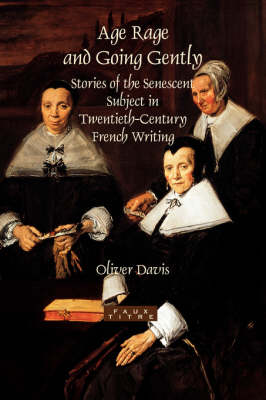This wide-ranging study looks at how the ageing process has alternately been figured in and excluded from twentieth-century French literature, philosophy and psychoanalysis. It espouses a critical interdisciplinarity and calls into question the assumptions underlying much research into ageing in the social sciences, work in which the negative aspects of growing older are almost invariably suppressed. It offers a major reappraisal of Simone de Beauvoir's great but neglected late treatise, La Vieillesse, and presents the first substantial discussion of a lost documentary film about old age in which Beauvoir appears and which she helped to write, PROMENADE AU PAYS DE LA VIEILLESSE. Questioning Beauvoir's own rather reductive reading of Gide's work on old age, this study analyses the way in which his Journal and Ainsi soit-il experiment with a range of representational models for the senescent subject. The encounter between psychoanalysis and ageing is framed by a reading of Violette Leduc's autobiographical trilogy, in which she suggests that psychoanalysis, to its detriment, simply cannot allow ageing to signify. This claim is tested in a critical survey of recent theoretical and clinical work by psychoanalysts interested in ageing in France, the UK and the US. Lastly, Herve Guibert's recently republished photo-novel about his elderly great-aunts, Suzanne et Louise, is examined as a work of intergenerational empathy and is found, in addition, to be an important statement of his photographic aesthetic. Navigating between the extremes of fury ('age rage') and serene acceptance ('going gently'), this study aims throughout to examine the role which ageing plays in formal, as well as thematic, terms in writing the life of the subject.
- ISBN10 9042020261
- ISBN13 9789042020269
- Publish Date 1 January 2006
- Publish Status Active
- Publish Country NL
- Publisher Brill
- Imprint Editions Rodopi B.V.
- Format Paperback
- Pages 225
- Language English
- URL brill.com/product_id81179
